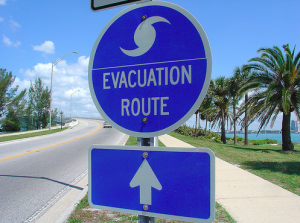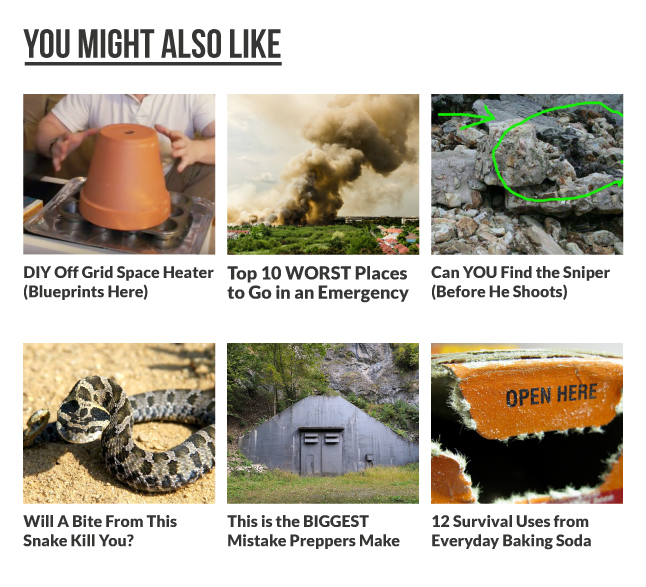 For residents in the heartland and the Southeast, there’s no more dangerous time of year than storm season. From Texas to Michigan, this tornado season has proven to be one for the record books. And with the hurricane season expected to produce a heightened level of named storms, it’s absolutely critical that you review your emergency evacuation plans…
For residents in the heartland and the Southeast, there’s no more dangerous time of year than storm season. From Texas to Michigan, this tornado season has proven to be one for the record books. And with the hurricane season expected to produce a heightened level of named storms, it’s absolutely critical that you review your emergency evacuation plans…
And if you don’t have any — make them.
You can’t afford to put this off. If you and your loved ones are “evacuation ready” — i.e. ready to evacuate and move to a safe zone at a moment’s notice — then you have greatly increased your chances of surviving a catastrophic weather event.
If you live in “Tornado Alley,” you may have only minutes to jump in your car and get your family out of the path of an approaching tornado. That’s why, I can’t stress it enough, you must sit down at the kitchen table and make a comprehensive emergency plan for your family immediately.
These tactics will help your family get to safety in the event of wildfire or hurricane evacuations, just as much as it will help them evade riots, civil unrest, or urban terrorism.
The important thing is that you create a solid plan and communicate that plan to everyone you will be evacuating with. Here are my Top 5 Evacuation Preparedness Tips:
1. Create an Evacuation Plan
Evacuation, or “bugging-out” in prepper-speak, is virtually the same in all emergencies. So creating an extensively thought-out evacuation plan can serve double-duty in your master plan.
Your evacuation plan should include routes, destinations, and even meet-up points along your routes in case you and your loved one are separated before, during, or after a weather emergency. Everyone in your household should be well aware of what to do in an emergency scenario, that includes Plan A, B, C, and so on…
The only realistic way to ensure that everyone is on the same page is to run through drills. Emergency preparedness drills should be held at least once a year, before storm season to remind the members of your household of your preps.
2. Buy a Hand Crank Weather Radio
Unless you are telepathic and have anticipated the exact path of the storm, chances are you will be relying on the local media or the National Weather Service for critical up-to-the-moment updates.
You must have a backup plan if the power goes out. That’s why a battery-powered weather radio with a hand-crank option is ideal. Learn the important frequencies and program them if possible into your radio as soon as you buy it. If you radio isn’t programmable, use a permanent marker to write the frequencies on the back of your radio.
3. Keep a Vehicle Gassed and Ready
Keep at least one of your vehicles fueled at all times – at least half-full. There’s no telling what type of traffic you may have to sit through on your evacuation route.
And don’t count on a quick fuelling stop along the way. Chances are good there will be long lines at the pump and many gas stations running out of supplies completely. In an evacuation, there is no time to swing by the convenience store. Keeping a vehicle fueled at all time may save your life.
4. Bug-Out Bags
If you’re not familiar with the terminology, a “bug-out bag” is simple a bag (usually a backpack) filled with all the supplies you’ll need to survive for 72-hours. That includes water, energy bars, first aid supplies, knives, etc.
Keep a bug out bag packed for each person in your family with at least 3 days worth of food and water per person, as well as handheld communications, personal protection weapons, and warm clothing.
If there is something you can’t live without, such as a precious heirloom, then pack it before hand if it is small enough. Realize that great grandpa’s baby grand piano might not make it.
5. Communication Drills
Along with your rehearsed emergency preparedness drills, all members of your household should have a plan for communicating with each other before, during and after an emergency.
Ideally, everyone would have a battery-operated walkie-talkie or radio (such as a Motorola Talkabout) in their bug-out bag. But other analog signals are just as important, if not more so.
Signals such as lowering a flag or stacking rocks on your front porch can be used to communicate important information, such as that your family has evacuated to grandma’s house, or to your safe location, or that everyone is OK.
Disaster areas are typically littered with makeshift message boards, each filled with information left for loved ones. By creating a few important analog signals, you can avoid one of these helpless situations.

